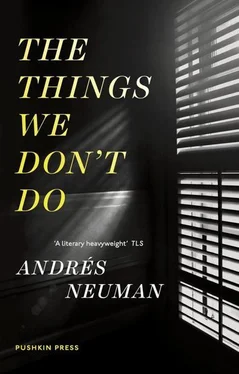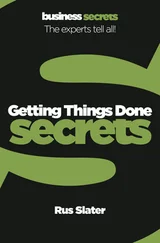We dined on three portions of cured meats and smoked cheese. We drank two glasses of Lagunilla, four Riojas, two Palo Cortados and a few Ribera del Dueros. For dessert Lisandro had an espresso, but I wanted an ice cream. In this weather? he asked quite sensibly. I replied pretentiously that one could only truly appreciate the taste of ice cream on a cold night. We paid the bill and walked outside. I remember the waiter at the tavern kept staring at us while he was drying glasses behind the bar. Where shall we go? Lisandro asked, rubbing his hands and exhaling a white vapour. Where they’ll give us an ice cream, I said, and started walking towards Café Fútbol. At this time of night Café Fútbol will be closed, he predicted. I didn’t answer. Lisandro followed me, muttering between gritted teeth. Don’t you have any cigarettes left? I asked spitefully. Afterwards we carried on walking in silence.
I could have done a bit more than I did when those two guys stopped us at the top of Calle Pavaneras. We were very drunk, Lisandro explains to everyone. That might convince him, but not me. I remember perfectly, with complete clarity, their faces, their clothes, their voices. Lisandro, on the other hand, barely recalls what colour hair the man who stabbed him had. I saw them coming from the corner opposite, and I noticed how they crossed over and started approaching. Lisandro saw nothing, or the little he saw he misinterpreted: he asked me, when it was almost obvious they would stop in front of us, whether I thought they might give us a cigarette. Stupidly, the moment they blocked our way I thought about my ice cream. Also about how small the two guys were, about shouting at them to go to hell, about kicking out to defend ourselves. I thought of hundreds of things, but not about handing over the banknotes I had in my jeans’ pocket. Lisandro took it all as a joke. It was pathetic to see him laughing as he grappled with the bald guy in the black leather jacket, and to see myself meanwhile not moving a muscle, timidly asking them to stop until I contemplated, terrified, the fair-haired mugger slicing the air with a switchblade.
They operated on Lisandro that same night. The most humiliating thing for me was having had to change one of my banknotes in the bar to pay the taxi driver who took us to the hospital. The duty doctor there examined him and told me I should call the police and report an attempted murder. Lisandro, blood pouring through the bandages strapped around his left shoulder, began to howl like a dying beast as they wheeled him into the operating theatre suffering from arterial bleeding. The doctors spent several days trying to stem the infection in his penetrating wound.
They did all they could to save his arm. Because of the bacterial infection he had contracted, amputation was recommended if they wanted to reduce the chances of his dying to zero. Lisandro’s mother wept on my shoulder, howled at me, swore at me, hit me, embraced me, thanked me, and then fainted in the waiting room of the operating theatre, moments before Lisandro’s bed was wheeled inside for the third time. When I next saw my friend, sprawled on his back in a bed on the fourth floor, he was a one-armed man trying to smile.
While Lisandro was getting better and the police investigation was running its course, my condition grew steadily worse. I was suffering from anxiety, loss of appetite alternating with the impulse to devour everything, my head ached continuously, and, worst of all, I couldn’t sleep for more than two hours at a time without suddenly waking up with palpitations. I would dream about the arm: Lisandro and I were walking down the street when all of a sudden he exclaimed: Hey, you, I bet you don’t dare take your arm off! with which he began biting into his forearm until he managed to tear it off in one piece. Curiously, in my dreams there wasn’t a single drop of blood. The wound was clean, as if he was a detachable doll. Instead, Lisandro’s mouth was red and moist as he spoke to me excitedly. I would wake up with a start and run into the kitchen where I would torment myself in silence, with the lights off. I would think not only about how miserly I had been telling those guys we had no money, not only about my cowardly refusal to get involved in the fight, but above all about my terrible good fortune. Why had they stabbed Lisandro first instead of starting with me? And why had Lisandro, bleeding as he was, about to lose consciousness, still tried to defend me when the fair-haired mugger threatened to jump on me?
I would see Lisandro’s amputated arm everywhere: in the street, hiding between passengers on a bus, on the empty beds being wheeled down the hospital corridors. It pained me to see myself naked in the mirror before having a shower, limbs intact. With slight variations, I carried on dreaming that Lisandro was happily severing his arm in front of me. Sometimes he himself would hurl it far away. Other times he would ask someone for a cigarette in exchange for his arm and then let them take it from him. And on the grisliest of occasions, he would give it to me ceremoniously, as if it were an offering, with his good arm. Meanwhile, in the waking world, Lisandro was getting better and about to be discharged from hospital. On those nights I dreamt that a fair-haired mugger in an apron handed Lisandro his missing arm, which he casually replaced before coming to visit me.
After a fortnight’s complete rest at home, Lisandro began to walk on his own without feeling dizzy or sick, and a week later he was already going out and he even went to buy bread for his mother. He returned with the left sleeve of his jumper tied in a knot, waving the bag with his one arm, and sat down to rest in the armchair. I went to lunch with them almost every day, and sometimes I stayed the night. You’ve no idea how tiring it is to walk propelling yourself with only one arm, Lisandro told me. He also kept thanking me again and again for all the time I spent looking after him and keeping him company. But I realized that, given the situation, Lisandro was too effusive with me. After a few days I started to suspect he had secretly decided to hate me because of what had happened that night. I continued dreaming, only the story lines had changed: now Lisandro was chasing me down Gran Vía in order to take one of my arms. No matter how fast I ran he would catch me.
Gradually the intervals between my visits to Lisandro’s house became longer, and I tried to plan our conversations beforehand. I needed to study his movements. I think he sensed my intentions, because he spoke to me less, listening to me instead and staring at me. I realized then that I was right, and when Lisandro finally started going out again in the evenings, I began cautiously confining myself to my apartment. Lisandro called me from time to time and suggested we have a few drinks in Calle Elvira, but I almost always managed to wriggle out of his invitation by making up some excuse.
One afternoon he dropped by unannounced. As I opened the door to him, I silently calculated how many steps I needed to get to the kitchen, open the top drawer and take out a knife to defend myself. I wasn’t required to do it because Lisandro walked in, sat down in my armchair and closed his eyes so as to hum along to the Miles Davis track that was playing. He spent the entire time sitting there, without even explaining why he had come. But his visit was like a warning to me. The next time he came round, we both knew what would happen. That was when, as I said goodbye to Lisandro, patting his good shoulder, I decided not to waste any more time.
A month has passed since then, and things seem to have returned to normal. If I had to make an assessment, despite the case against those thugs not having come to anything as yet, I would even say that our friendship has been strengthened. Every morning, Lisandro comes round to my place. He lets himself in with his own key, knocks on my bedroom door, comes in and rolls up the blinds. He usually finds me with my eyes open. He says good morning and goes into the kitchen to prepare breakfast. He slowly squeezes three or four oranges, makes coffee for us both, comes into my room, leaves two empty cups, goes back to the kitchen, fetches the pot of coffee, brings it to my room and fills the two cups. After two or three trips, we can tuck into a good breakfast. He smokes in the morning. I prefer to wait until after lunch. Lisandro has been looking after me for a few weeks now, and I must say nobody has ever taken such care of me. In some sense, yes, things have gone back to the way they were: he has forgiven me, I can see it in his eyes. Thanks to his ministrations I feel calmer and I am making a quick recovery. I know I will soon be able to start going out, and will gradually be able to forget my grimace in the mirror as I started to saw off my left arm.
Читать дальше












